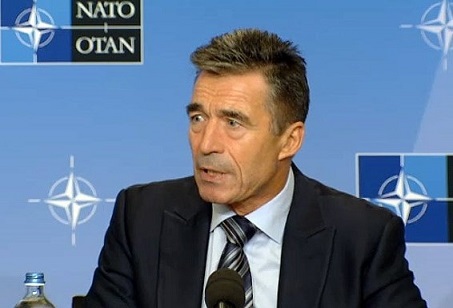NATO chief details package to “bring Georgia closer” to Alliance

NATO may hold military exercises in Georgia and establish a military training centre in the country, see more Georgian participation in NATO exercises and possibly expand the local NATO liaison office, said a top NATO official at the final press conference before this week’s NATO Summit in Wales.
NATO’s outgoing Security General Anders Fogh Rasmussen shed some light on the "unprecedented package” being offered to Georgia at the September 4-5 Summit, which aimed to bring Georgia closer to the Alliance.
While he couldn’t divulge the full package, Rasmussen stressed there were "very concrete measures” in place that would bring Georgia closer to NATO.
He said the package NATO planned to offer would assist Georgia continue reforms and modernisation of the defence and security sector and "step up” its efforts to improve the ability of the Georgian Armed Forces to work and operate alongside NATO forces, "including more Georgian participation in NATO exercises”.
"Thirdly, occasional military exercises might also be organised in Georgia, in particular with a view to engaging NATO partners in such exercises,” Rasmussen said.
"Fourth, we are also considering the establishment of a military training centre in Georgia again with a particular view to engaging NATO partners. There might also be a regional dimension in such a training centre.”
Furthermore, the NATO official also said there was a possibility to expand the NATO liaison office in Tbilisi.
"The Georgia package will definitely bring Georgia closer to NATO,” Rasmussen told journalists at the media conference in Brussels yesterday.
In June it was decided Georgia would not be offered a Membership Action Plan (MAP) but NATO said the country would be offered an "unprecedented package” to bring Georgia closer to the Alliance.
Meanwhile, Rasmussen’s press conference to global media focussed on possible action NATO would take in response to the ongoing crises in the world. He believed this was a "crucial summit in NATO’s history” and it would "address the challenges of a changed world”.
"This is a time of multiple crises on several fronts. To the east, Russia is intervening overtly in Ukraine. To the south, we see growing instability, with fragile states, the rise of extremism, and sectarian strife.”
"NATO's greatest responsibility remains to protect and defend our populations and our territories. We also need the capacity to manage crises. And to work with partners to help build stability. So at the Summit, we will ensure that the Alliance remains ready, able and willing to defend all Allies against any attack,” Rasmussen said.
With many possible changes on the agenda to make NATO "fitter, faster and more flexible to adjust to all kinds of security challenges”, Rasmussen emphasized the reason behind this was not because NATO wanted to attack anyone, "but because the dangers and the threats are more present and more visible. And we will do what it takes to defend our Allies”.
 Tweet
Tweet  Share
Share